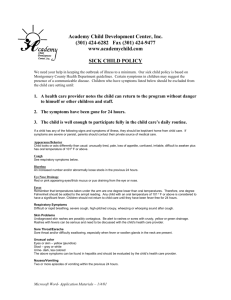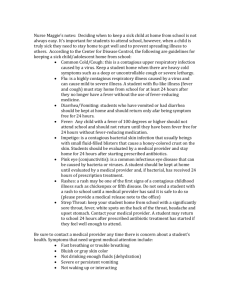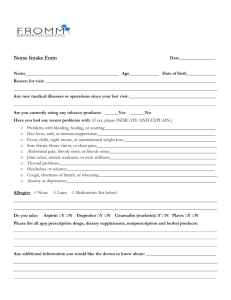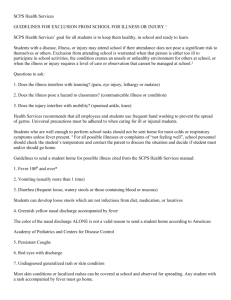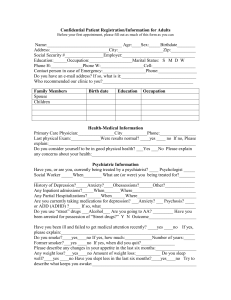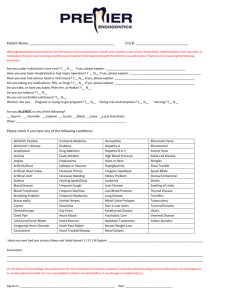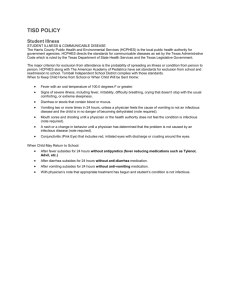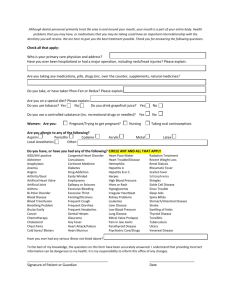Exclusion policy for communicable diseases
advertisement
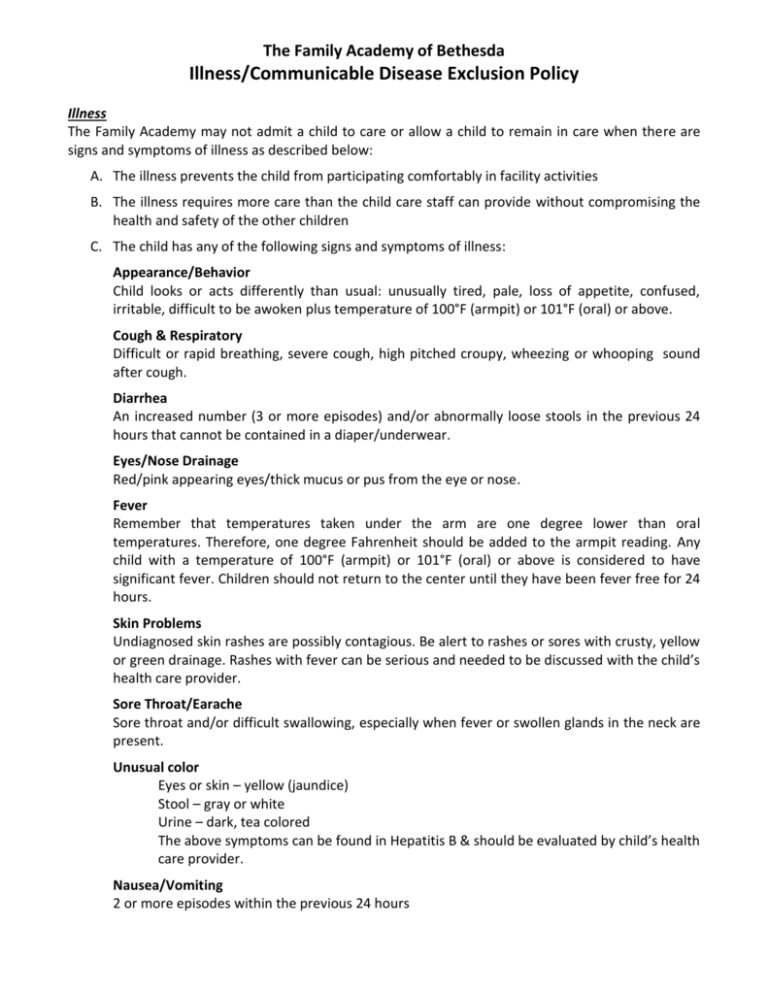
The Family Academy of Bethesda Illness/Communicable Disease Exclusion Policy Illness The Family Academy may not admit a child to care or allow a child to remain in care when there are signs and symptoms of illness as described below: A. The illness prevents the child from participating comfortably in facility activities B. The illness requires more care than the child care staff can provide without compromising the health and safety of the other children C. The child has any of the following signs and symptoms of illness: Appearance/Behavior Child looks or acts differently than usual: unusually tired, pale, loss of appetite, confused, irritable, difficult to be awoken plus temperature of 100°F (armpit) or 101°F (oral) or above. Cough & Respiratory Difficult or rapid breathing, severe cough, high pitched croupy, wheezing or whooping sound after cough. Diarrhea An increased number (3 or more episodes) and/or abnormally loose stools in the previous 24 hours that cannot be contained in a diaper/underwear. Eyes/Nose Drainage Red/pink appearing eyes/thick mucus or pus from the eye or nose. Fever Remember that temperatures taken under the arm are one degree lower than oral temperatures. Therefore, one degree Fahrenheit should be added to the armpit reading. Any child with a temperature of 100°F (armpit) or 101°F (oral) or above is considered to have significant fever. Children should not return to the center until they have been fever free for 24 hours. Skin Problems Undiagnosed skin rashes are possibly contagious. Be alert to rashes or sores with crusty, yellow or green drainage. Rashes with fever can be serious and needed to be discussed with the child’s health care provider. Sore Throat/Earache Sore throat and/or difficult swallowing, especially when fever or swollen glands in the neck are present. Unusual color Eyes or skin – yellow (jaundice) Stool – gray or white Urine – dark, tea colored The above symptoms can be found in Hepatitis B & should be evaluated by child’s health care provider. Nausea/Vomiting 2 or more episodes within the previous 24 hours When a child becomes ill in the center, the parent/guardian will be contacted and asked to pick his/her child up from care within an hour. When a child is sent home, he/she should remain at home for at least 24 hours. When a child is sent home due to fever, he/she should be kept at home for 24 hours after the fever goes down to 98.6 degrees without fever reducing medications. Communicable Disease Certain symptoms of illnesses (listed above) in children may suggest the presence of a communicable disease such as conjunctivitis, impetigo, strep throat, head lice, scabies, chicken pox, pertussis, Hepatitis A virus, etc.. Children who have the symptoms of illness should be excluded from the center. Required conditions for children to return to the center: Children who have signs and symptoms of illness should be excluded from the center until: A Doctor’s note that the child can return to the center without danger to himself or other children and staff. The symptoms have been gone for 24 hours The child is well enough to participate fully in the center’s daily routine (including outdoor time). Exclusion for Acute Illness (COMAR 13A.16.11) The center may not admit a child to care or allow a child to remain in care when the child is exhibiting symptoms of acute illness. A child may not be readmitted to care after an absence of 3 days or more due to illness without written statement from the parent or physician that the child may return to a regular schedule. Administration of Prescription Medications and Non-prescription Medications A Medication Authorization Form must be filled out by parent/guardian with child’s name, amount and dates to be administered. Prescription medications must be in a container labeled by the pharmacy or physician with the child’s name, dosage, and expiration date. At least one dose of prescription medication must be given at home prior to the child’s arrival at the center. Non-prescription medications must be in the original manufacturer’s container labeled with instructions for dosage and expiration date. The center may administer only one-dose of nonprescription (over-the counter) medications to a child per illness. Over the counter medications administered in the center require a written order from the health care provider with prescriptive authority and parent written authorization when more than one dose is given. We cannot administer homeopathic medicines or herbal preparations in the school.
